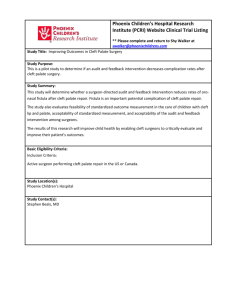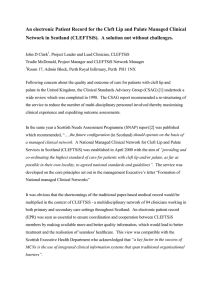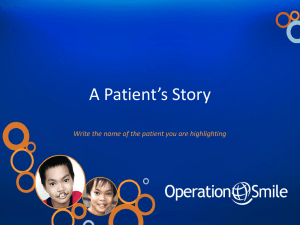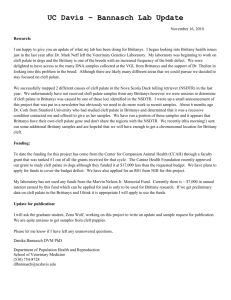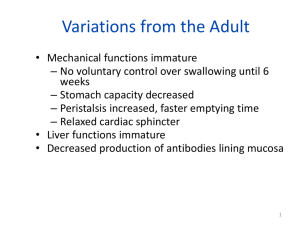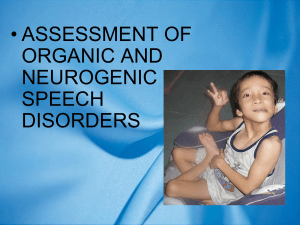Programme Specification
advertisement
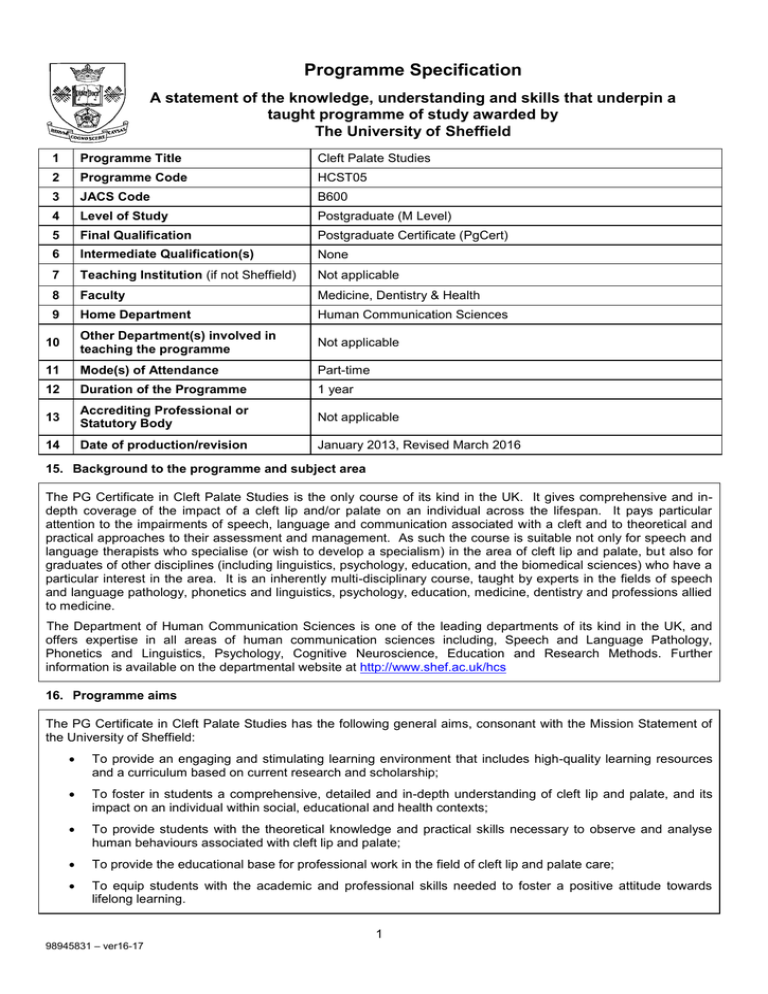
Programme Specification A statement of the knowledge, understanding and skills that underpin a taught programme of study awarded by The University of Sheffield 1 Programme Title Cleft Palate Studies 2 Programme Code HCST05 3 JACS Code B600 4 Level of Study Postgraduate (M Level) 5 Final Qualification Postgraduate Certificate (PgCert) 6 Intermediate Qualification(s) None 7 Teaching Institution (if not Sheffield) Not applicable 8 Faculty Medicine, Dentistry & Health 9 Home Department Human Communication Sciences 10 Other Department(s) involved in teaching the programme Not applicable 11 Mode(s) of Attendance Part-time 12 Duration of the Programme 1 year 13 Accrediting Professional or Statutory Body Not applicable 14 Date of production/revision January 2013, Revised March 2016 15. Background to the programme and subject area The PG Certificate in Cleft Palate Studies is the only course of its kind in the UK. It gives comprehensive and indepth coverage of the impact of a cleft lip and/or palate on an individual across the lifespan. It pays particular attention to the impairments of speech, language and communication associated with a cleft and to theoretical and practical approaches to their assessment and management. As such the course is suitable not only for speech and language therapists who specialise (or wish to develop a specialism) in the area of cleft lip and palate, but also for graduates of other disciplines (including linguistics, psychology, education, and the biomedical sciences) who have a particular interest in the area. It is an inherently multi-disciplinary course, taught by experts in the fields of speech and language pathology, phonetics and linguistics, psychology, education, medicine, dentistry and professions allied to medicine. The Department of Human Communication Sciences is one of the leading departments of its kind in the UK, and offers expertise in all areas of human communication sciences including, Speech and Language Pathology, Phonetics and Linguistics, Psychology, Cognitive Neuroscience, Education and Research Methods. Further information is available on the departmental website at http://www.shef.ac.uk/hcs 16. Programme aims The PG Certificate in Cleft Palate Studies has the following general aims, consonant with the Mission Statement of the University of Sheffield: To provide an engaging and stimulating learning environment that includes high-quality learning resources and a curriculum based on current research and scholarship; To foster in students a comprehensive, detailed and in-depth understanding of cleft lip and palate, and its impact on an individual within social, educational and health contexts; To provide students with the theoretical knowledge and practical skills necessary to observe and analyse human behaviours associated with cleft lip and palate; To provide the educational base for professional work in the field of cleft lip and palate care; To equip students with the academic and professional skills needed to foster a positive attitude towards lifelong learning. 1 98945831 – ver16-17 17. Programme learning outcomes Knowledge and understanding Students will be able to demonstrate knowledge and understanding of: K1 a range of methodologies appropriate to collecting and analysing information about individuals with a cleft palate; K2 a range of theoretical approaches to the study of cleft palate speech; K3 the impact of a cleft lip and palate on an individual, across the lifespan, within social, educational and health contexts; K4 the configuration of the professional care team for individuals with cleft lip and palate, and the roles and responsibilities of individual members of the team; K5 a range of approaches to the management of speech and language impairments associated with cleft lip and palate. Skills and other attributes: Students will be able to: S1 demonstrate the ability to write and speak effectively about a range of theoretical and practical issues in the field of cleft lip and palate; S2 access information about cleft lip and palate from a variety of sources, including books, journals, the internet, professional reports, clinical case-notes, research databases and professional colleagues; S3 demonstrate familiarity with a range of IT skills, including word-processing, performing electronic searches and use of the internet; S4 use phonological and psycholinguistic frameworks to analyse and interpret speech processing associated with cleft lip and palate; S5 use phonetic transcription to make perceptual analyses of speech production associated with cleft lip and palate; S6 demonstrate familiarity with a range of instrumental techniques for the analysis of speech production associated with cleft lip and palate. 18. Teaching, learning and assessment Development of the learning outcomes is promoted through the following teaching and learning methods: The modules use a blended learning approach, which combines face-to-face sessions with a range of e-learning materials. A range of teaching and learning methods are employed including lectures, seminars, tutorials and practical workshops according to the nature of the material to be covered. Seminars and workshops, in particular, allow students to engage as active participants in the learning process. This is particularly important in areas such as phonetic transcription, data analysis, case presentations and other group activities. Broadly, lectures, seminars and guided reading will be used to develop the knowledge based outlined in Section 17 K1-5 above; workshops, tutorials and assignments will be used to develop skills S1-S6. The theme of theory and practice links will run through all teaching and learning sessions. Some modules are taught as short (two- to three-day) study blocks; others by weekly sessions. All modules are supported by further structured material provided through MOLE (My Online Learning Environment). Tutorials offer guidance in the preparation of written assignments, feedback on students’ progress and general support towards attaining learning outcomes. Opportunities to demonstrate achievement of the programme learning outcomes are provided through the following assessment methods: Assessment varies slightly from module to module. For the most part, assessment consists of coursework exercises while the module is in progress, together with an assignment (such as an essay, data analysis assignment or oral presentation) at the end of a module. All individual assessments are tailored to the requirements of the specific skill, ability, activity or knowledge area being assessed, and cover both theoretical and practical aspects. The assessment schedule is structured to provide opportunities for feedback fairly early on in the course and at regular intervals thereafter. 2 98945831 – ver16-17 19. Reference points The learning outcomes have been developed to reflect the following points of reference: The Strategic Plan of the University of Sheffield (http://www.sheffield.ac.uk/strategicplan) informed the design and the content of the curriculum, ensuring, for example, that teaching is informed by current developments in research. The Royal College of Speech & Language Therapy Guidelines for Continuing Professional Development, the Royal College of Speech and Language Therapists Handbook for Practice (Communicating Quality 3) and the Forum of Lead Cleft Lip and Palate Speech & Language Therapists UK also influenced the development of this course. 20. Programme structure and regulations Please refer to the Programme Regulations, General University Regulations and the On-line Directory of Modules for detailed information about the structure of programmes, regulations concerning assessment and progression and descriptions of individual modules. 21. Student development over the course of study Semester 1 HCS6027 Developing an Evidence Base for Practice 15 HCS6105 Cleft Palate: Speech Production and Multidisciplinary Care 15 Semester 2 HCS6103 Cleft Palate: Speech Assessment 15 HCS6104 Cleft Palate: Intervention and Service Provision 15 22. Criteria for admission to the programme Detailed information regarding admission to the programme is available in the University’s On-Line Prospectus at http://www.sheffield.ac.uk/study/ and also in the department’s website at http://www.shef.ac.uk/hcs. Applicants should normally have a First class or Upper Second class degree or equivalent in a relevant discipline, such as Linguistics, Speech Sciences, Speech and Language Therapy. Candidates with a diploma or ordinary degree in speech and language therapy can be accepted if the candidate can show continued learning and experience after the first qualification; such candidates may however be recommended for the Diploma Cleft & Speech (CLASP) in the first instance. Non-native speakers of English require an IELTS score of 7 or above with at least 6 in each component, or equivalent. 23. Additional information This specification represents a concise statement about the main features of the programme and should be considered alongside other sources of information provided by the teaching department(s) and the University. In addition to programme specific information, further information about studying at The University of Sheffield can be accessed via our Student Services web site at www.shef.ac.uk/ssid. The website of the Department of Human Communication Sciences can be found at: http://www.shef.ac.uk/hcs. 3 98945831 – ver16-17
